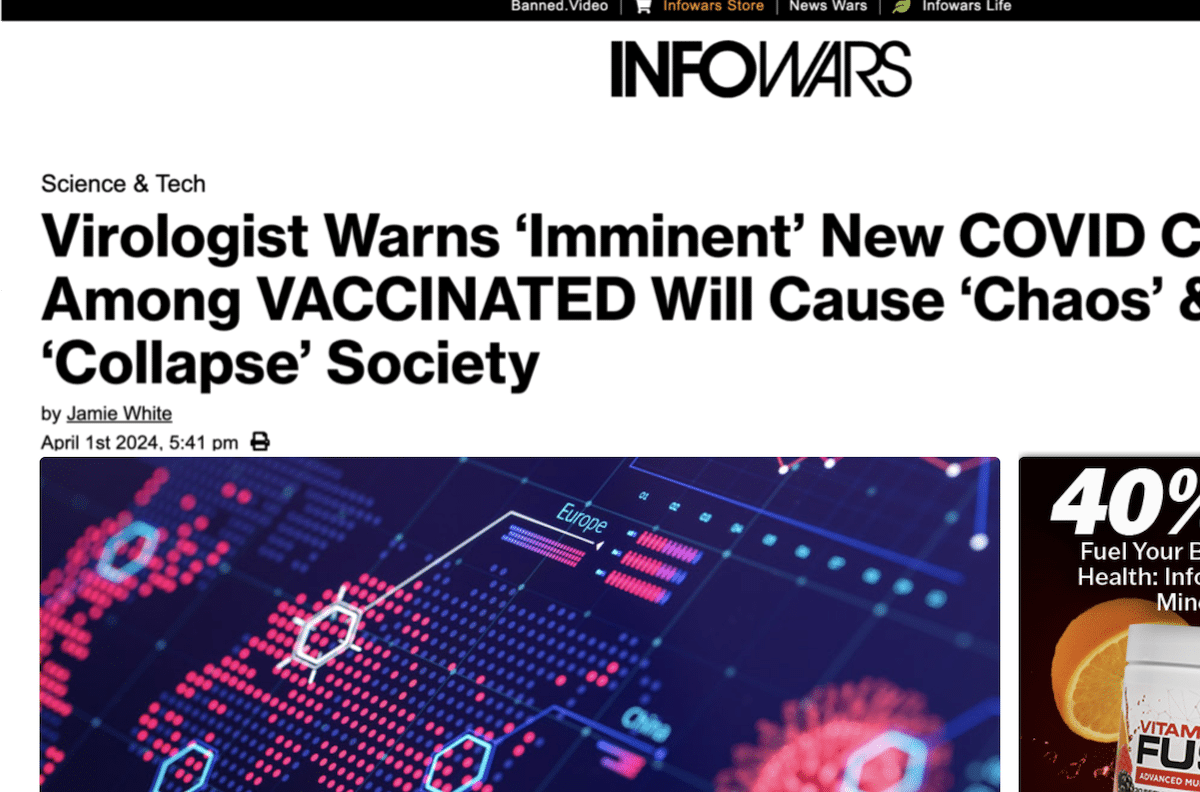- Health
COVID-19 vaccines reduce the risk of death from COVID-19; the vaccines don’t alter our DNA
Key takeaway
Studies show that COVID-19 vaccination reduces the risk of severe illness and death from COVID-19. COVID-19 vaccines don’t alter people’s DNA. No reliable scientific evidence shows that hydroxychloroquine, azithromycin, and ivermectin cure COVID-19.
Reviewed content

Verdict:
Claim:
Canadian data shows vaccinated people more likely to die from COVID-19; COVID-19 vaccines alter our DNA; hydroxychloroquine and ivermectin cure COVID-19
Verdict detail
Factually inaccurate: COVID-19 vaccines don’t alter people’s DNA.
Misrepresents a complex reality: The age-standardized rates of COVID-19 hospitalizations, ICU admissions, and deaths don’t account for important differences in vaccinated and unvaccinated people, such as a higher proportion of people with underlying health conditions among vaccinated people. Therefore, such rates don't necessarily reflect vaccine effectiveness.
Unsupported: Studies so far have shown that hydroxychloroquine and ivermectin are ineffective at treating or preventing COVID-19.
Full Claim
“‘Stunning’ official Canadian data now shows vaccines raise the risk of death from COVID. Vaccinated people are more likely to be hospitalized or die from COVID”; “Why aren't they still talking about therapeutics? Azithromycin, hydroxychloroquine, ivermectin”; “Anthony Fauci has admitted that [the COVID-19 vaccines] don’t work very well”
Review
On 17 July 2022, political activist Charlie Kirk published a video on Facebook, claiming that Canadian data showed COVID-19 vaccines increase the risk of death from COVID-19. The video was viewed more than 720,000 times and shared more than 21,000 times. Kirk also rehashed old, inaccurate, and misleading claims that COVID-19 vaccines are “gene-altering therapy” that hydroxychloroquine and ivermectin cure COVID-19, which have already been debunked by fact-checkers before, as we will show below.
Claim 1 (Incorrect): “‘Stunning’ official Canadian data now shows vaccines raise the risk of death from COVID. Vaccinated people are more likely to be hospitalized or die from COVID.”
Kirk cited an article by journalist Alex Berenson to support this claim. Berenson, who made multiple inaccurate and misleading claims about COVID-19 and vaccines, claimed in a Substack article that data from the Manitoban government showed that, vaccinated people “were about 50 percent more likely to be hospitalized or die of Covid than unvaccinated people” in May 2022. Below is the graph referenced by Berenson.

The age-standardized rate of hospital admissions, ICU admissions, and deaths associated with COVID-19 in Manitoba for April (top) and May (bottom) 2022. Note how the trends in April contrast with those in May.
While the data presented here accounted for differences in risk due to age—which is important because severe COVID-19 is associated with advanced age— the difference in the number of vaccinated and unvaccinated people, and the amount of time a person spent in each vaccination status, there are other important factors that remain unaccounted for. For example, people with preexisting health conditions that increase their risk of severe COVID-19 are more likely to be overrepresented among vaccinated people. This, along with differences in infection levels, different variants, and differing levels in immunity from prior infection, mean that age-standardized rates don’t necessarily reflect vaccine effectiveness, as the UK Office of National Statistics cautioned:
“The [age-standardized mortality rates] give the age-adjusted risk of death for the people in the different vaccination status groups. Estimating vaccine effectiveness is challenging when vaccination status is not allocated at random, as factors that vary between the vaccination status groups and over time need to be accounted for to determine the causal impact of vaccines on mortality.”
Furthermore, the data showed a different trend in April 2022, just a month before the one that Berenson used, indicating a lower rate of hospitalizations and deaths in both the vaccinated and the people who received a booster dose. Therefore, Berenson may have cherry-picked data that supported the narrative he wished to present and left out data that conflicted with his narrative.
If the COVID-19 vaccines contributed to the risk of severe COVID-19 outcomes, as Berenson and Kirk claimed, we would expect to see the same or even more pronounced trend in people who received a booster dose (the blue bar in the graph), since these people received the most doses among the three groups. However, the rate of death in people who received a booster dose is the same as in unvaccinated people, not higher. Berenson himself was aware of this, as he wrote: “People who had received boosters had roughly the same risk of hospitalization or death as the unvaccinated”. Nevertheless, he went on to claim that the “data show vaccines now RAISE the risk of death from Covid”, which is demonstrably false.
Data for the whole of Canada—which provides a larger sample size than just Manitoba alone—also contradict Berenson’s claim. Health Canada reported that from 9 May to 5 June 2022, “unvaccinated cases were 4 times more likely to be hospitalized and 5 times more likely to die from their illness, compared to cases with a completed primary vaccine series. During the same 4-week period, unvaccinated cases were 4 times more likely to be hospitalized and 6 times more likely to die from their illness, compared to cases with a completed primary vaccine series and 1 or more additional doses”.
Large-scale studies support this observation, finding that COVID-19 vaccines reduce the risk of severe COVID-19 and death. Indeed, a modeling study published in The Lancet Infectious Disease estimated that COVID-19 vaccination saved tens of millions of lives globally[1]. While the emergence of SARS-CoV-2 variants has dampened vaccine effectiveness against disease[2,3], getting vaccinated remains safer than not getting vaccinated.
Claim 2 (Misrepresents source): “Anthony Fauci has admitted that [the COVID-19 vaccines] don’t work very well”
As evidence for this claim, Kirk highlighted a Fox News segment from 12 July 2022, in which Anthony Fauci, the White House chief medical advisor, said:
“One of the things that’s clear from the data [is] that even though vaccines – because of the high degree of transmissibility of this virus – don’t protect overly well, as it were, against infection, they protect quite well against severe disease leading to hospitalization and death.”
However, Kirk only presented the part where Fauci said that “vaccines – because of the high degree of transmissibility of this virus – don’t protect overly well”, leaving out the rest in which he clarified that COVID-19 vaccines are still effective at keeping people from becoming seriously ill and dying. By doing so, Kirk distorted the meaning of Fauci’s words.
Claim 3 (Factually inaccurate): COVID-19 vaccines are “gene-altering therapy”
This old claim is false and has been refuted many times. As explained in numerous fact-checks, the COVID-19 vaccines cannot alter our DNA. The mRNA used in the Pfizer-BioNTech and Moderna COVID-19 vaccines are unable to directly integrate into our DNA, because RNA is chemically different from DNA.
Nevertheless, some continued to propagate this false claim through various means, such as by citing an inaccurate Forbes article headline or a study by Lund University, which allegedly showed that RNA from the Pfizer-BioNTech COVID-19 vaccine was reverse-transcribed, or converted into DNA, and entered the cells. The study set out to determine if mRNA from the vaccine was reverse-transcribed and if so, whether the resulting DNA entered the nucleus of the cell, where DNA is stored. The experiments were conducted in human liver cells originating from a hepatocarcinoma (liver cancer). As this Health Feedback review explained, the experiments didn’t show that vaccine mRNA was reverse-transcribed or that foreign DNA entered the nucleus of the cells, much less integrate into cell DNA.
Claim 4 (Unsupported): “Why aren’t they still talking about therapeutics? Azithromycin, hydroxychloroquine, ivermectin”
Early in the pandemic, hydroxychloroquine, azithromycin, and ivermectin were touted by some as preventative and curative medicine for COVID-19. However, there is no reliable scientific evidence to support this claim. As we reported in previous Health Feedback reviews, large-scale randomized controlled trials, including those conducted by the University of Oxford and the U.S. National Institutes of Health, didn’t find any of these drugs to be effective at reducing the risk of infection, hospitalization, and death from COVID-19[4-7].
REFERENCES
- 1 – Watson et al. (2022) Global impact of the first year of COVID-19 vaccination: a mathematical modelling study. The Lancet Infectious Diseases.
- 2 – Andrews et al. (2022) Covid-19 Vaccine Effectiveness against the Omicron (B.1.1.529) Variant. New England Journal of Medicine.
- 3 – Link-Gelles et al. (2022) Effectiveness of 2, 3, and 4 COVID-19 mRNA Vaccine Doses Among Immunocompetent Adults During Periods when SARS-CoV-2 Omicron BA.1 and BA.2/BA.2.12.1 Sublineages Predominated — VISION Network, 10 States, December 2021–June 2022. Mortality and Morbidity Weekly Report.
- 4 – The Recovery Collaborative Group. (2020) Effect of Hydroxychloroquine in Hospitalized Patients with Covid-19. New England Journal of Medicine.
- 5 – Self et al. (2020) Effect of Hydroxychloroquine on Clinical Status at 14 Days in Hospitalized Patients With COVID-19: A Randomized Clinical Trial. JAMA.
- 6 – WHO Solidarity Trial Consortium. (2021) Repurposed Antiviral Drugs for Covid-19 — Interim WHO Solidarity Trial Results. New England Journal of Medicine.
- 7 – Reis et al. (2022) Effect of Early Treatment with Ivermectin among Patients with Covid-19. New England of Journal of Medicine.



